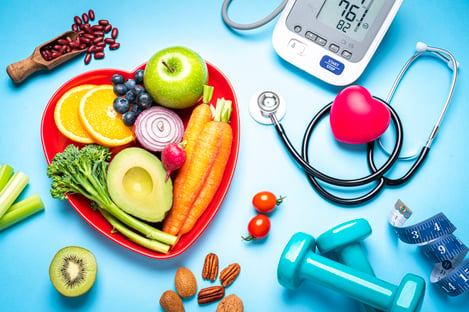 Did you know that cardiovascular disease is one of the leading causes of death? According to the CDC, heart disease is the leading cause of death for men, women, and people of most racial and ethnic groups in the United States. One person dies every 36 seconds in the United States from cardiovascular disease. About 655,000 Americans die from heart disease each year—that's 1 in every 4 deaths.
Did you know that cardiovascular disease is one of the leading causes of death? According to the CDC, heart disease is the leading cause of death for men, women, and people of most racial and ethnic groups in the United States. One person dies every 36 seconds in the United States from cardiovascular disease. About 655,000 Americans die from heart disease each year—that's 1 in every 4 deaths.
It’s because of this fact that the American Heart Association (AHA) has poured millions into heart research and producing guidelines to help people not only manage heart conditions but prevent them, too. One initiative by the AHA that has been around is the Life’s Simple 7 for heart health. Life's Simple 7 is defined by the American Heart Association as the 7 risk factors that people can improve through lifestyle changes to help achieve ideal cardiovascular health. Let’s take a look!
Life’s Simple 7
- Manage blood pressure. High blood pressure can put strain on your heart, arteries, and kidneys, leading to heart disease and stroke. Both exercise and nutrition can help here. Nutritionally speaking, be sure to watch your sodium (salt) intake, keeping your intake at 1,500–2,300mg per day. Also, eat plenty of fruits and veggies to get fiber!
- Control cholesterol. When cholesterol levels are high, plaque buildup causes clogged arteries. This also leads to stroke and heart disease. For healthy cholesterol levels, it is important to manage total fat intake and eat a balanced diet. Fat intake should make up about 20–35% of total calories. Of those fats, be sure that the bulk come from unsaturated sources, such as olive oil, avocado, nuts, and seeds.
- Reduce blood sugar. Everything we eat turns into sugar (aka glucose), but glucose is most readily available in the carbohydrates we eat. Our bodies use this glucose for energy. Now, carbohydrates and glucose are important! However, just like everything else, we want to find a balance. Chronically high levels of blood glucose can be damaging to the heart, eyes, nerves, and kidneys. If you struggle with high blood sugar, be sure to consult your Registered Dietitian, Primary Care Provider, and Endocrinologist. The team can come up with a care plan to manage your blood sugar.
- Get active. Living an active life comes with far more benefits than just heart health! But for heart health, it is recommended to exercise 150–300 minutes per week at a moderate intensity level. Outside of that time, be sure to stay active by going on walks, doing yard work, taking “standing breaks” from sitting down, and stretching.
- Eat better. A balanced and nutritious diet is always a game changer. The things we put into our bodies matter. When you eat a nutritious diet, you are giving your body one of the best weapons to combat cardiovascular disease. This goes both ways, though; when we eat junk a majority of the time, we are opening the gates to a plethora of chronic diseases.
- Maintain a healthy weight. To be honest, I wish this said “maintain a healthy body composition.” Current research shows that body composition (fat mass and lean body mass) is far more indicative of risk for chronic disease than total body weight. Maintaining healthy body fat levels and adequate lean muscle mass reduces the burden on your heart, lungs, blood vessels, and skeleton.
- Stop smoking. Cigarette smoking is one of the leading risk factors for cardiovascular disease. If you do smoke, consider sitting down with your healthcare team and coming up with a plan to quit. Like everything, this is absolutely your choice, but do be aware that smoking drastically increases your chances of heart disease.
Take It One Step at a Time
Now, if you are anything like me, you may be thinking “that is not ‘simple.’” Trust me, I agree. That is my only critique of these guidelines. It is not that simple. These things take work and time; I do not want to downplay that. My suggestion is to pick one at a time and work on it. Then, once you have that down, move on to another. Keep repeating this until you feel like all your bases are covered and heart-healthy lifestyle habits are in place.
NIFS Can Help
As always, NIFS professionals are here to help! We have certified personal trainers to assist in getting active (step 4); a Clinical Registered Dietitian who can assist with eating better (step 5) and blood sugar, blood pressure, and cholesterol control (steps 1–3); a weight-loss program for step 6; and health coaches to help with navigating lifestyle steps to stop smoking. All of these can, in turn, lead to healthier cholesterol, blood sugar, and blood pressure levels (steps 1–3). Please reach out if you need anything! We are here to help keep you and your heart healthy.
This blog was written by Sabrina Goshen, NIFS Registered Dietitian. To learn more about the NIFS bloggers, click here.


 The holidays are HERE! We all know what happens around the holidays. I see two extremes in my practice as a Registered Dietitian:
The holidays are HERE! We all know what happens around the holidays. I see two extremes in my practice as a Registered Dietitian: One of the most critical things we do for our health is sleep. Without sufficient sleep, we risk impairing cognitive function, developing chronic diseases and mental disorders, and even an early death.
One of the most critical things we do for our health is sleep. Without sufficient sleep, we risk impairing cognitive function, developing chronic diseases and mental disorders, and even an early death. There is no escaping the colors of the sugary candy that is around every corner. From jelly beans to chocolate bunnies and Cadbury eggs, the temptations are endless and the calories are empty.
There is no escaping the colors of the sugary candy that is around every corner. From jelly beans to chocolate bunnies and Cadbury eggs, the temptations are endless and the calories are empty.